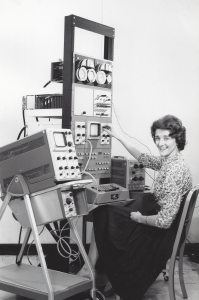Clive Thompson in the New York Times:
 As a teenager in Maryland in the 1950s, Mary Allen Wilkes had no plans to become a software pioneer — she dreamed of being a litigator. One day in junior high in 1950, though, her geography teacher surprised her with a comment: “Mary Allen, when you grow up, you should be a computer programmer!” Wilkes had no idea what a programmer was; she wasn’t even sure what a computer was. Relatively few Americans were. The first digital computers had been built barely a decade earlier at universities and in government labs.
As a teenager in Maryland in the 1950s, Mary Allen Wilkes had no plans to become a software pioneer — she dreamed of being a litigator. One day in junior high in 1950, though, her geography teacher surprised her with a comment: “Mary Allen, when you grow up, you should be a computer programmer!” Wilkes had no idea what a programmer was; she wasn’t even sure what a computer was. Relatively few Americans were. The first digital computers had been built barely a decade earlier at universities and in government labs.
By the time she was graduating from Wellesley College in 1959, she knew her legal ambitions were out of reach. Her mentors all told her the same thing: Don’t even bother applying to law school. “They said: ‘Don’t do it. You may not get in. Or if you get in, you may not get out. And if you get out, you won’t get a job,’ ” she recalls. If she lucked out and got hired, it wouldn’t be to argue cases in front of a judge. More likely, she would be a law librarian, a legal secretary, someone processing trusts and estates.
But Wilkes remembered her junior high school teacher’s suggestion. In college, she heard that computers were supposed to be the key to the future. She knew that the Massachusetts Institute of Technology had a few of them. So on the day of her graduation, she had her parents drive her over to M.I.T. and marched into the school’s employment office. “Do you have any jobs for computer programmers?” she asked. They did, and they hired her.
More here.
